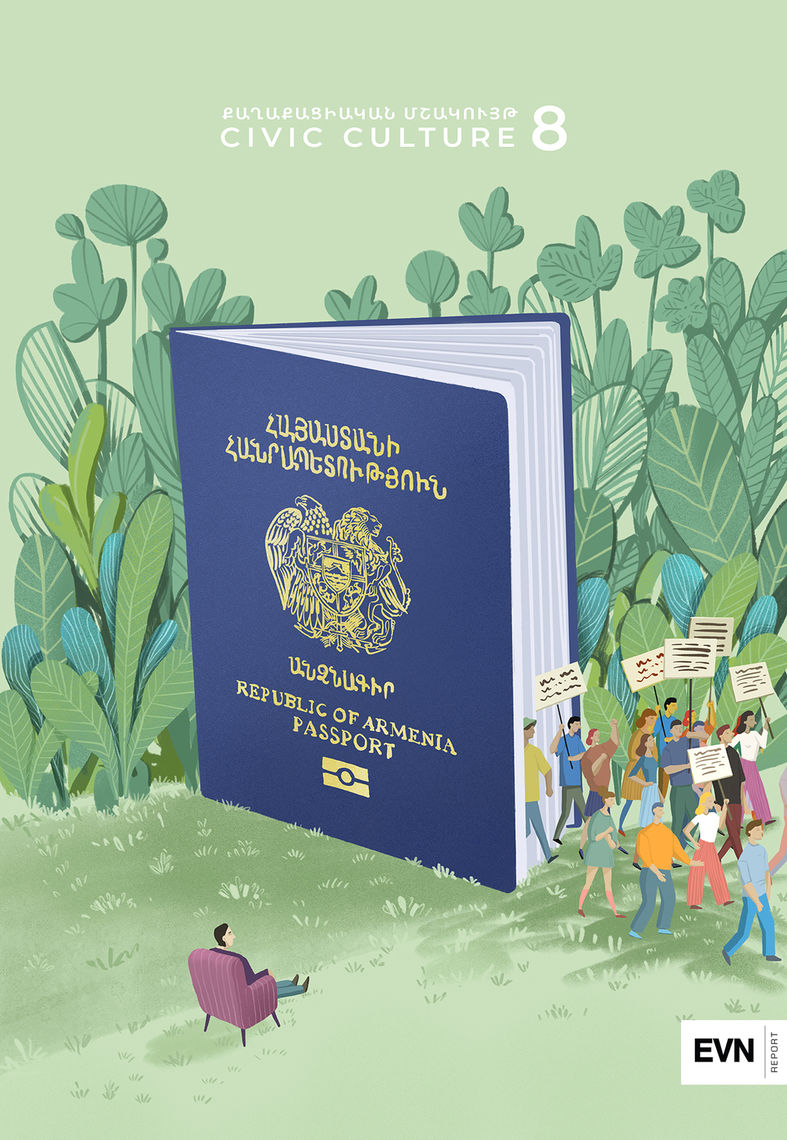
Illustration by Armine Shahbazyan.
“If I can provide food, jobs and healthcare, that is human rights. What the opposition is saying, or civil society or your NGOs—I don’t bother with that.” These words shocked the international human rights community. They were uttered in 2018 by Sheikh Hasina, who was elected Prime Minister of Bangladesh four consecutive times. It was a controversial expression, as the state must ensure the protection of all human rights without exception.
Looking back on events in Armenia, political parties mostly focus on issues related to the social welfare of people rather than the protection of civil, political and other rights. In fact, most protests in Armenia have been over pocketbook issues like utilities and bus fares. Questions are rarely raised regarding the right to freedom of speech, transparent and accountable governance, and so on.
Meanwhile, the protection of human rights goes beyond demanding action from political authorities; it provides citizens the right to influence or be directly involved in the decision-making process.
The Human Being is the Highest Value
Human rights, freedoms and obligations are the established standards that regulate relations between civilians and the State.
The Armenian Constitution and laws recognize human rights as the highest value.
An entire chapter of the Constitution is dedicated to human rights, and there are laws on separate types of rights, which regulate the procedures for their exercise, restriction and protection, such as the Electoral Code, the Labor Code, the Law on the Rights of the Child, the Law on Copyright and Related Rights, etc.
The State is obligated to respect and protect human rights as the highest value.
“The respect for and protection of the basic rights and freedoms of the human being and the citizen shall be the duty of the public power.
The public power shall be restricted by the basic rights and freedoms of the human being and the citizen as a directly applicable law.”
Armenian Constitution, Article 3
The Obligations of a Free Human Being
Alongside numerous rights and freedoms, the phrase “shall be obligated” appears several times in the Constitution. Thus, the supreme law imposes several obligations on a person/citizen:
* Everyone shall be obligated to take care of the preservation of the environment (Article 12).
* Every citizen shall be obligated to take part in the defense of the Republic of Armenia, as prescribed by law (Article 14).
* Everyone shall be obligated to pay taxes and duties prescribed in accordance with the law and make other mandatory payments to the state or community budget (Article 60).
It is important to highlight the importance of Article 39 of the Constitution: “A human being shall be free to do anything that does not violate the rights of others and does not contradict the Constitution and laws. No one may bear obligations that are not prescribed by law.”

In order for a democracy to function properly, it needs a citizenry that participates in civic duties. Civic culture can also be defined as a set of political attitudes, habits and behavior on behalf of citizens who are aware of their political rights and how the decision-making process affects their lives and society. Thereby, political awareness and participation/involvement in civic life ensure stability and progress. Understanding the rights and responsibilities of good citizenship is an ongoing process and involves many aspects from obeying the law to taking responsibility for oneself and to voting in elections. This month’s issue features stories about those rights and responsibilities, including individual awareness, the role of civil society and the role of the judiciary in defending human rights.
The Authority of the People and How to Exercise It
Armenia is a democratic state and power belongs to the people. This is enshrined in the Constitution. The people exercise their power through free elections, referendums, state and local self-government bodies and officials.
Put in simpler terms, a person has the rights and opportunities to participate in the governing of the state and to exercise control over that government.
Thus, besides participating in elections and referendums, everyone has the right to submit, either individually or jointly with others, petitions to state and local self-government bodies and officials and to receive an appropriate reply within a reasonable time frame (Article 53).
According to the Law on Petitions, a petition is a letter on issues of public importance, a report on the shortcomings of the work of state structures and officials, or a proposal to improve their activities or to resolve various issues.
It is interesting that even a child can submit a petition: those under the age of 14 submit their petition through their parent or legal guardian.
At the same time, the Constitution views the guarantee of local self-governance as one of the essential pillars of democracy (Article 9) and defines the direct participation of community residents in the management of community affairs through local referendums and other means (Article 183).
Article 11 of the Law on Local Self-Government states that every resident over the age of 16 is informed, without discrimination, about the activities of local self-government bodies and may have a direct or indirect influence on the decisions of local self-government bodies.
At the same time, an issue may be included on the agenda of the Council of Elders (city council) on the initiative of community residents․ In this case, from 1% to 4% of the residents (depending on the total population of the community) must sign the document on the proposed initiative and submit it to the head of the community. The issue submitted by the residents is discussed at the meeting of the Council of Elders within a month of receiving it.
It’s the Citizen Who Holds the Official Accountable
One of the main principles of democracy is open governance, the main components of which are transparency, participation and accountability. In other words, when the actions of the state are visible to the people, they not only observe, but also have the opportunity to participate in the management process and to demand that governing bodies be accountable for their actions.
Armenia has been a member of the Open Government Partnership initiative since 2011, which aims to improve the governance system through the active involvement of civil society and raising the level of transparency, reliability and accountability of state-citizen relations.
Today, a number of legislative norms and open data platforms in Armenia (for example, e-gov.am, armeps.am, ethics.am, etc.) gives citizens the ability to dive into the details of the state budget; state procurement and land sales; and the financial declarations of state officials, etc.
At the same time, citizens can request information, regulated by the Law on Freedom of Information and inquire about government activities through the e-request.am website.
Open government reduces the risk of abuse, as officials understand that they are under the supervision of the public, the media, civil society and other bodies, which makes them more cautious and responsible. This also leads to improvement in the quality of their work and services they provide to the public.
Voluntarily Waiving Your Right to Avoid Being a “Troublemaker”
The existence of legislation and tools do not necessarily guarantee their meaningful implementation. Citizens must be well-informed, aware and be ready to participate in governing processes and more importantly, demanding accountability.
People in Armenia often think that using these tools and exercising their rights is a shameful exercise. For example, talking about a particular mistake or omission is perceived as “making trouble.” There are many cases when a person has been marginalized simply because they complained about the actions of a public servant, such as a teacher or doctor, have refused to partake in any illegal activity and have raised the alarm.
During Stalin’s repressions, “trouble makers” were considered to be those who made false accusations and betrayals, resulting in exile, with their backs to the wall, facing a firing squad.
Stereotypical approaches to this phenomenon are also expressed by high-ranking officials and the label of “trouble maker” is heard from the highest podium of the Republic of Armenia. This issue was discussed by the deputies in the National Assembly in the context of bills which envisage giving citizens an opportunity to report a violation. It should be clearly emphasized that the person who raises the alarm about an alleged violation, misdemeanour or crime is a decent and law-abiding person, whose goal is to eliminate the problem and contribute to building a society where these violations are eliminated, or at least reduced in number and scope.
In another case, when the financial records of officials are publicized, some people perceive this as “sticking your hand in someone else’s pocket” or “counting someone else’s money,” when in fact, it’s about protecting one’s own pocket. After all, a significant portion of the state budget comes from taxes and duties paid by the people, and state officials are paid from these same resources.
These labels are also given to journalists and media outlets that publish analytical and investigative articles. Often the audience does not distinguish between open source information and state secrets and considers the dissemination of such information a “betrayal.”
In all these cases, people never fail to complain about corruption, theft, nepotism and numerous violations, although they have the right and tools to participate in the fight against these ills.
In order to ensure real democratic and open government, the state is obligated not only to introduce legislative reforms and modern technologies, but also to educate the public on how to exercise their power, and to take steps to shape an independent and strong civil society.
Only then will the individual living in Armenia, who has few responsibilities but many rights and freedoms, refrain from begging leaders to solve their problems, but will instead participate directly in their solution.

